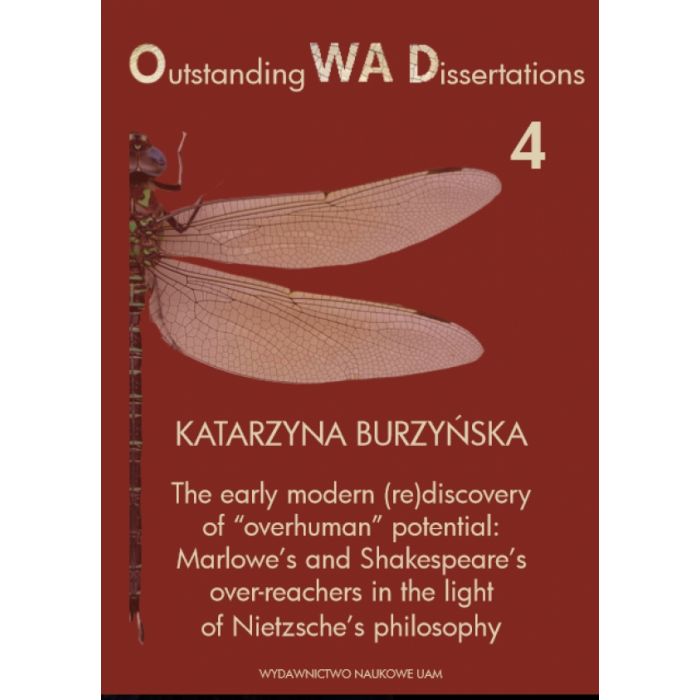The early modern (re)discovery of “overhuman” potential: Marlowe’s and Shakespeare’s over-reachers in the light of Nietzsche’s philosophy
- In Stock: in stock
- ISBN: 978-83-232-2985-8
- Category: OUTLET, English Philology, Literary Studies, Philosophy and Logic, Outstanding WA Dissertations (OWAD), Open Access
- Year of publication: 2016
This book presents the analysis of the selected characters from Christopher Marlowe’s and William Shakespeare’s dramas in the light of Friedrich Nietzsche’s key philosophical ideas. The characters under scrutiny may be seen as “overreachers” – exceptionally ambitious figures who relentlessly aspire to power. The indomitable and excessively ambitious characters have a lot in common with Nietzsche’s conception of “the overman”, who is characterized by the strong will to power. This parallel becomes a point of departure for a rereading of the “overhuman” potential in the English Renaissance drama and the identity of an early modern human being. So Nietzsche’s philosophy is utilized to analyse the concept of human singularity in the English Renaissance. Moreover, the analysis demonstrates the practical usage of Nietzsche’s philosophy in literary analysis. The book consists of five chapters: two theoretical and three analytical ones. Chapter one presents a methodological basis for the entire work, while chapter two deals with a cultural and historical background of the Renaissance. The first analytical chapter is a rereading of Marlowe’s protagonists – Tamburlaine (Tamburlaine, the Great) and Barabas (The Jew of Malta). Chapter four analyses Shakespeare’s Brutus (Julius Caesar), Macbeth (Macbeth) and Edmund (King Lear). The last chapter is devoted to female characters from Marlowe’s and Shakespeare’s plays (Zenocrate from Tamburlaine, the Great, Lady Macbeth and Lear’s daughters).
Głównym celem pracy jest analiza wybranych bohaterów dramatów Williama Szekspira i Krzysztofa Marlowe’a w świetle kluczowych koncepcji filozofii Fryderyka Nietzschego. Analizowane postaci, określane w języku angielskim jako „overreachers” charakteryzują się wyjątkowo silną ambicją i niejednokrotnie bezkompromisowo dążą do władzy i panowania. Ta analogia staje się punktem wyjścia do reinterpretacji „nadczłowieczego” potencjału w angielskim dramacie renesansowym, a także przyczynkiem do ogólniejszej refleksji na temat tożsamości człowieka renesansu. Połączenie nietzscheanizmu ze studiami nad angielskim dramatem siedemnastowiecznym jest niewątpliwie niszą badawczą, gdyż do tej pory nietzscheanizm nie stanowił narzędzia metodologicznego w dyskusji nad tożsamością człowieka odrodzenia. Zatem wykorzystanie potencjału filozoficznego nietzscheanizmu służy zarówno próbie odczytania na nowo pojęcia jednostkowości człowieka renesansu, jak również praktycznemu wykorzystaniu refleksji niemieckiego filozofa w interpretacji literackiej.
Do serii wydawniczej Outstanding WA Dissertations (OWAD) wybierane są wyróżniające się prace doktorskie obronione na Wydziale Anglistyki UAM. Zakres tematyczny prezentowanych monografii obejmuje studia nad językiem, literaturą i kulturą. Celem serii jest promocja wyników pracy młodych naukowców oraz wspieranie badań oryginalnych, stanowiących istotny wkład w rozwój nauki i zasługujących na upowszechnienie.
| Detailed information | |
|---|---|
| Contents |
Download file

|
|
|
|
| Publication Version | printed |
| Format | 17,0 x 24,0 |
| Type of publication | Monografia |
| Edition | I |
| Series | Outstanding WA Dissertations 4 |
| ISBN | 978-83-232-2985-8 |
| Number of pages | 326 |
| Number of publishing sheets | 24,00 |
| Type of binding | paperback |
